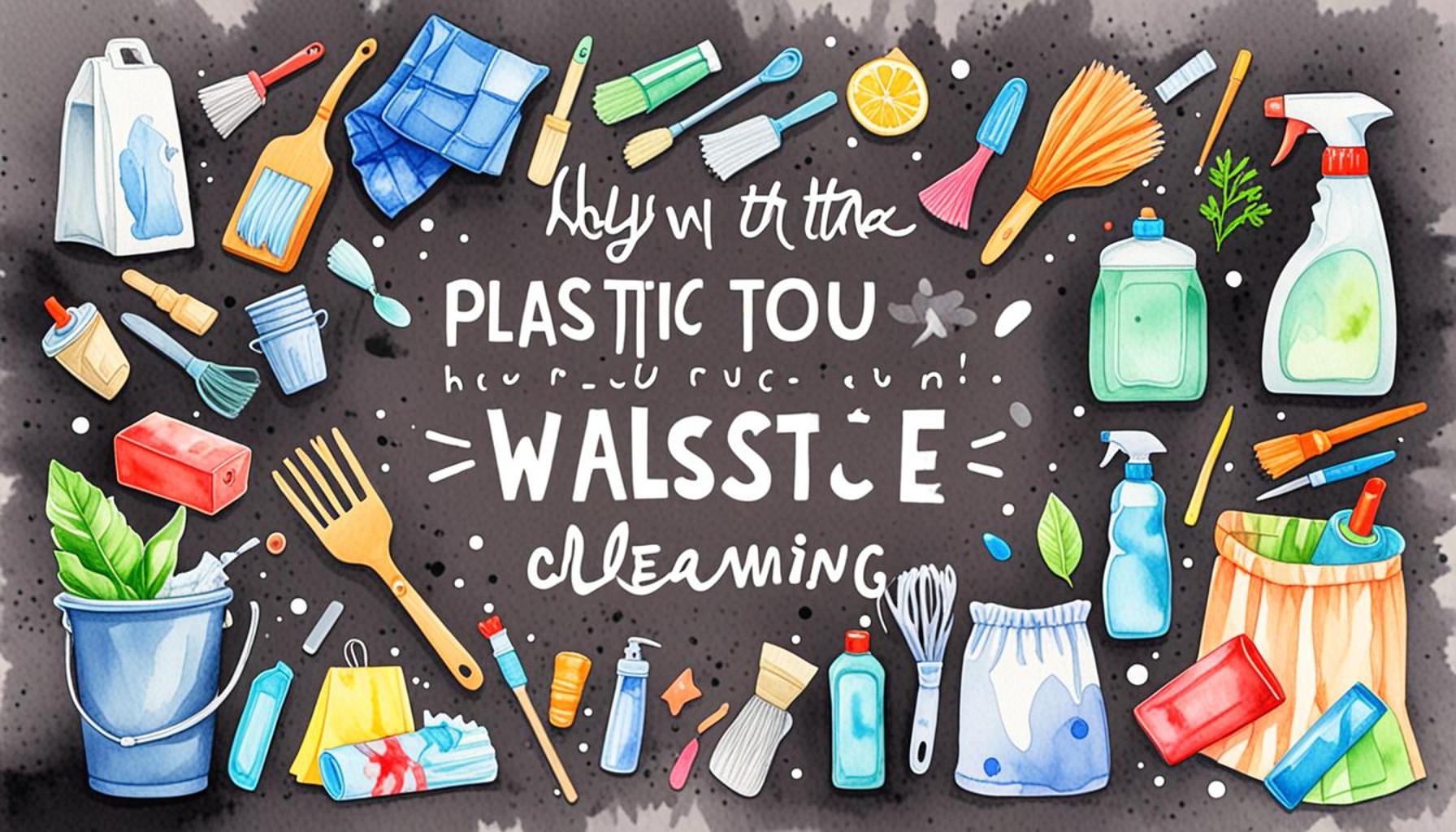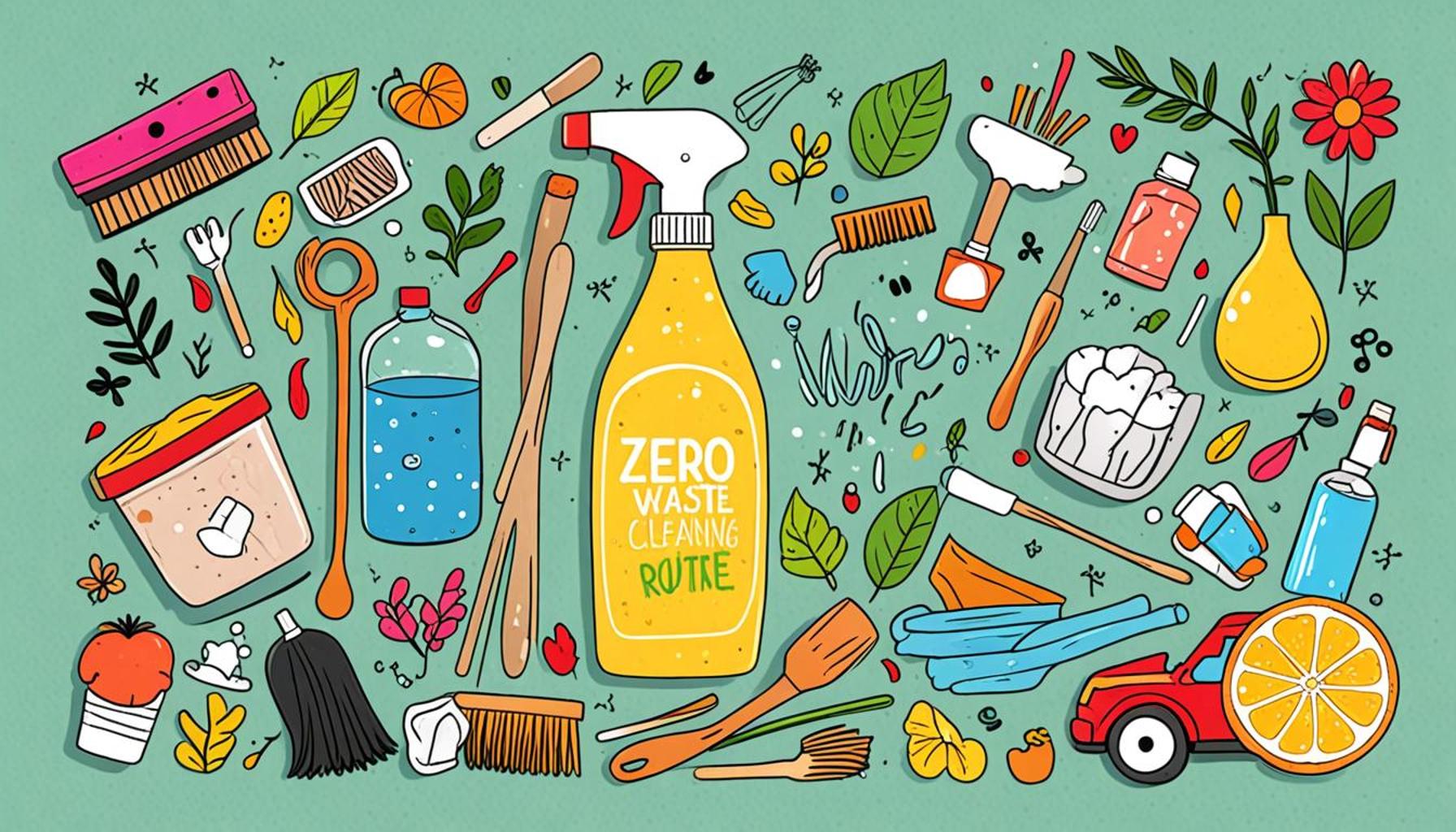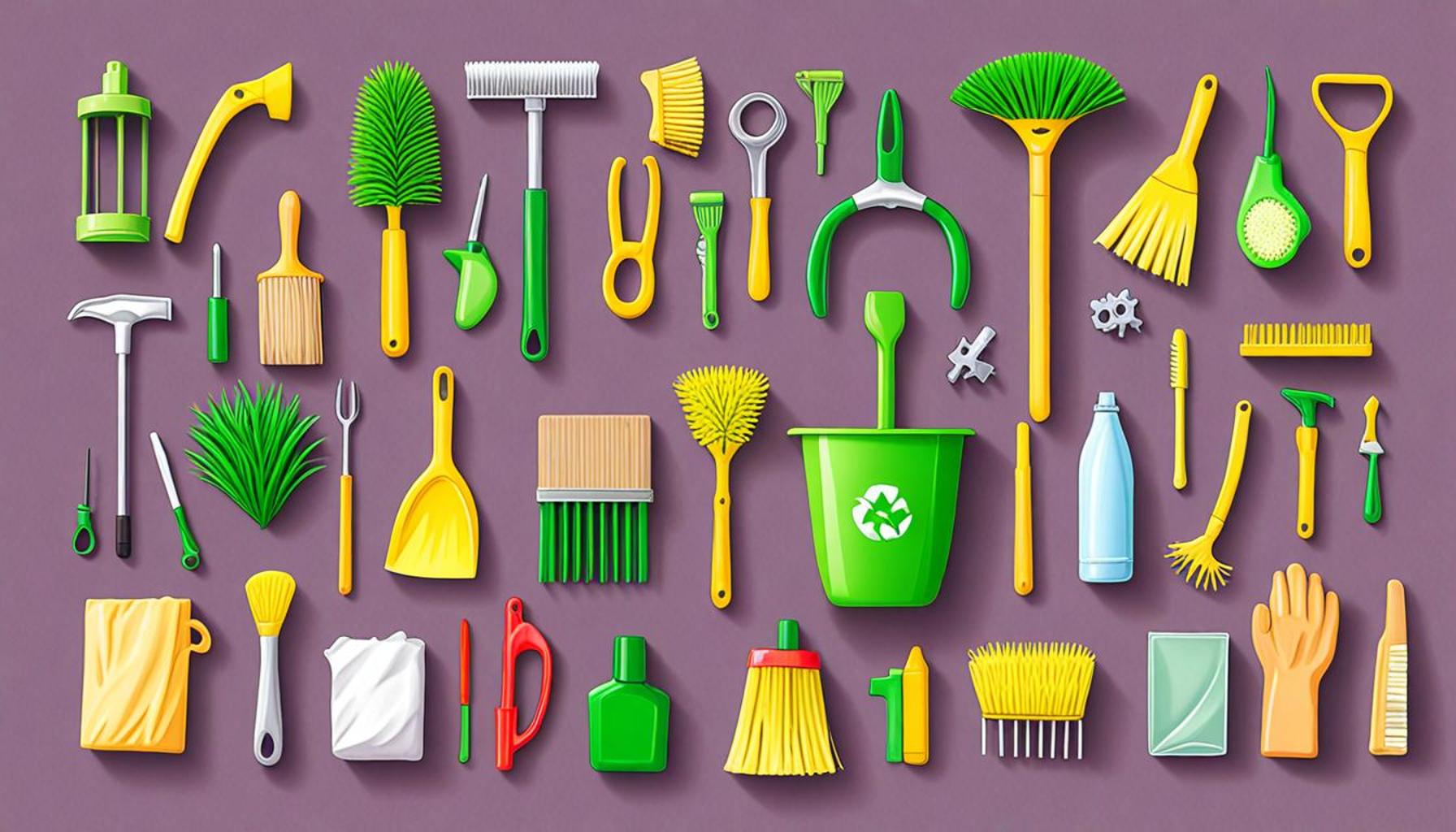10 Tips to Reduce Plastic Waste in Your Daily Cleaning Routine

The Growing Challenge of Plastic Pollution
Plastic pollution has surged into an environmental crisis, with an estimated 300 million tons of plastic produced worldwide every year. In the United States alone, approximately 8.5 million tons of plastic waste finds its way into the oceans, wreaking havoc on marine life and ecosystems. This overwhelming situation is often attributed to our everyday habits, especially those surrounding household cleaning routines. Fortunately, there are practical solutions to this pressing issue that allow us to maintain clean living spaces while also practicing sustainability.
The Role of Cleaning Products in Plastic Waste
Household cleaning products significantly contribute to the plastic waste crisis. The primary sources of this waste can be categorized as follows:
- Single-use plastic bottles: Many household cleaners come in plastic bottles, which are often designed for one-time use, leading to heaps of discarded containers.
- Non-biodegradable wipes: Disposable cleaning wipes are popular for their convenience but are a major source of plastic pollution, as they do not break down easily and can take hundreds of years to decompose.
- Inadequate recycling: Studies indicate that only about 9% of all plastic waste produced is actually recycled, with the majority ending up in landfills or the environment, further complicating the waste situation.
Simple Strategies for an Eco-Friendly Cleaning Routine
Transitioning to an eco-friendly cleaning routine does not compromise your home’s cleanliness. On the contrary, adopting simple changes can lead to significant reductions in plastic waste. Here are some effective strategies you can implement:
- Switch to bulk purchases: When possible, buy cleaning supplies in bulk. This not only cuts down on packaging waste but often offers considerable savings. Many warehouse stores, like Costco, provide options to purchase larger quantities of cleaners, which can be refilled in reusable containers.
- Choose concentrated formulas: Concentrated cleaning products are effective alternatives to standard formulations, as they need less water and thus come with less plastic packaging. Brands such as Seventh Generation and Method offer plant-based concentrates that are both effective and eco-conscious.
- DIY cleaning solutions: Embrace the power of natural cleaning agents found in your home. Common ingredients like vinegar, baking soda, and lemon juice can create powerful, effective cleaning solutions. For example, a simple vinegar and water solution can be used to clean countertops and windows, reducing both plastic use and chemical exposure.
In the following sections of this article, we’ll delve deeper into 10 actionable tips to reduce plastic waste in your daily cleaning routine. Each suggestion is designed to empower you to create a cleaner home while fostering a healthier planet. Are you ready to explore innovative and eco-friendly cleaning methods? Let’s discover how small, conscious choices can lead to impactful changes in our environmental footprint!
SEE ALSO: Click here to read another article
Adopt Reusable Alternatives to Common Cleaning Tools
One of the most straightforward ways to cut down on plastic waste in your daily cleaning routine is by opting for reusable alternatives instead of single-use items. Many household tasks can be accomplished with items that not only reduce plastic waste but also save you money over time. Here are some essential switches to consider:
- Reusable cleaning cloths: Instead of purchasing disposable paper towels that are packaged in plastic, invest in a set of reusable cleaning cloths. Made from materials like cotton, these cloths can be washed and reused multiple times, significantly decreasing your household’s plastic footprint.
- Replace plastic sponges: Traditional sponges often come wrapped in plastic and are not biodegradable. Instead, look for natural options made from materials such as cellulose or coconut fibers. They are effective in cleaning and break down more easily in compost, contributing to a more sustainable approach.
- Opt for mop pads you can wash: Many cleaning mops use single-use disposable pads that contribute to plastic waste. Consider switching to mops that have washable pads, which can clean your floors just as effectively while allowing you to avoid more plastic waste.
Support Brands with Sustainable Practices
As consumers become increasingly aware of the impact of plastic waste, many brands are evolving to meet this demand for sustainability. By choosing to support companies that prioritize eco-friendly practices, you not only help to reduce plastic in your own home but also encourage more businesses to adopt greener initiatives. Pay attention to:
- Refill programs: Companies like Blueland and Grove Collaborative offer refillable cleaning product containers that help minimize plastic packaging. You buy the initial container once and then simply purchase refill tablets or pouches that come in compostable or minimal packaging.
- Plastic-free certifications: Look for brands that actively promote their plastic-free credentials. Certifications from organizations committed to sustainability can guide you to products that align with your eco-friendly values.
- Community-focused initiatives: Some brands engage in local clean-up efforts or support initiatives aimed at reducing waste in communities. Supporting such brands not only contributes to a cleaner environment but also builds a sense of community awareness and responsibility.
By incorporating these strategies into your home cleaning routine, you actively participate in reducing plastic waste and promoting more sustainable practices. Each small step taken adds up to significant change, demonstrating that individual choices can collectively lead to a healthier planet.
10 Tips to Reduce Plastic Waste in Your Daily Cleaning Routine
Reducing plastic waste in your cleaning routine is not just about being eco-friendly; it’s about creating a sustainable lifestyle that benefits both you and the planet. The way we clean our homes often contributes significantly to plastic pollution. Here are 10 practical tips that can make a remarkable difference.
| Tip | Benefits |
|---|---|
| Use refillable cleaning products | Eliminates single-use plastic and reduces waste significantly. |
| Switch to natural sponges and cloths | Biodegradable options lessen environmental impact. |
| Ditch plastic bottles for bulk purchases | Buying in bulk reduces packaging waste. |
| Make homemade cleaning solutions | Non-toxic, cost-effective, and reduces reliance on plastic containers. |
| Choose compostable trash bags | Helps decrease plastic in landfills while supporting composting efforts. |
These tips not only simplify your cleaning process but also play a vital role in minimizing plastic waste. Incorporating them into your daily routine can lead to significant environmental improvements. Remember that every small action counts towards a larger goal of sustainability.
SEE ALSO: Click here to read another article
Explore Eco-Friendly Cleaning Products
Transitioning to eco-friendly cleaning products is pivotal in reducing plastic waste during household chores. Many conventional cleaning supplies are laden with harmful chemicals and packaged in plastic containers that contribute to environmental degradation. Fortunately, there is a rising number of alternatives that prioritize sustainability without compromising effectiveness. Here are some recommendations:
- Concentrated cleaning solutions: Look for eco-friendly cleaning products that come in concentrated forms. These are typically packaged in small bottles, significantly reducing plastic waste. You can mix them with water in a reusable spray bottle, providing a low-waste option that still meets your cleaning needs.
- DIY cleaning solutions: Consider crafting your own cleaning solutions using simple household ingredients. Items like vinegar, baking soda, and essential oils are not only effective but also come with minimal packaging. According to research, vinegar can cut through grime and disinfect surfaces effectively, while baking soda works wonders as a gentle abrasive cleaner.
- Plant-based cleaners: Many brands now offer cleaners made from plant-derived ingredients, designed to be biodegradable and free from harsh chemicals. These products typically use recycled or recyclable packaging, aligning with eco-friendly consumer values.
Incorporate Zero-Waste Practices
Incorporating zero-waste practices into your cleaning routine can further lessen your environmental impact. This philosophy emphasizes the reduction, reuse, and recycling of materials, resulting in a dramatic cut in plastic waste. Explore some practical ideas:
- Bulk buying: Purchase cleaning supplies in bulk whenever possible to minimize packaging waste. Many sustainable stores offer refill stations for popular products, allowing you to bring your own bottles. This approach not only reduces the amount of plastic you consume but can also save you money.
- Compostable cleaning tablets: New innovations include cleaning tablets that dissolve in water, allowing you to create your own cleaning solutions. These tablets often come in biodegradable packaging, making them an excellent zero-waste option.
- Donation and sharing: Before discarding unused cleaning products, consider donating them to local charities or schools. Sharing excess supplies with friends or family can also ensure that no product goes to waste, fostering a community approach to sustainability.
Rethink Your Waste Disposal Practices
While reducing plastic waste is critical, it’s equally important to reconsider how you dispose of your cleaning-related waste. Many cleaning products and tools can be recycled or disposed of in environmentally-conscious ways:
- Check local recycling guidelines: Understand the recycling rules in your area for cleaning product containers. Some plastics may be recyclable, which can drastically reduce waste in landfills.
- Participate in take-back programs: Many companies now offer take-back programs for their containers. Returning empty bottles or containers ensures responsible disposal and encourages companies to create sustainable packaging.
- Educate yourself about hazardous waste: Be mindful of improperly disposed of hazardous materials such as chemical cleaners. Find out where you can properly drop off such items to ensure they do not harm the environment.
By implementing these practices in your daily cleaning routine, you contribute significantly to the reduction of plastic waste and promote a more sustainable lifestyle. Each change, whether small or large, can cumulatively have a profound effect on the planet’s health, inspiring others to reevaluate their own cleaning habits.
CHECK OUT: Click here to explore more
Conclusion
Reducing plastic waste in your daily cleaning routine is not just a personal choice; it is a collective responsibility that can lead to significant environmental improvement. By embracing the 10 tips to reduce plastic waste outlined in this article, you can take meaningful steps toward a more sustainable lifestyle. Transitioning to eco-friendly products, adopting zero-waste practices, and reevaluating your waste disposal methods pave the way for a healthier planet.
It’s essential to recognize that every small change counts. For instance, opting for bulk buying will decrease plastic production while also saving you money, while making your own cleaning solutions can cut down on harmful additives and excessive packaging. Additionally, supporting brands that prioritize sustainable practices plays a crucial role in shifting industry standards. By actively participating in recycling programs and educating ourselves and our communities, we can combat the crisis of plastic pollution.
As your cleaning habits evolve, so too can the mindset of those around you. By leading by example, you not only contribute to a cleaner environment but also inspire others to follow suit. Together, we can create a movement towards sustainability that starts from within our homes. For a deeper understanding of the impact of plastic waste and more ways to tackle this issue, consider exploring local environmental initiatives or organizations dedicated to conservation. Your journey toward a more eco-friendly cleaning routine is just the beginning of a larger shift toward environmental stewardship.



